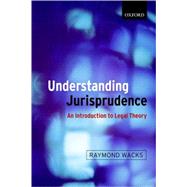Understanding Jurisprudence by Raymond Wacks adopts a novel approach to this challenging subject; It reveals the nature of legal theory with clarity, enthusiasm, and wit, without avoiding its complexities and subtleties. The author provides an illuminating guide to the central questions of legal theory. An experienced teacher of jurisprudence and distinguished writer in the field, his approach is stimulating, accessible, and even entertaining.
The concept of law lies at the heart of our social and political life. Jurisprudence explores the concept of law and its role in society. It elucidates its meaning and its relation to the universal questions of justice, rights, and morality. And it analyzes the nature and purpose of our legal system, and its practice by courts, lawyers, and judges.








